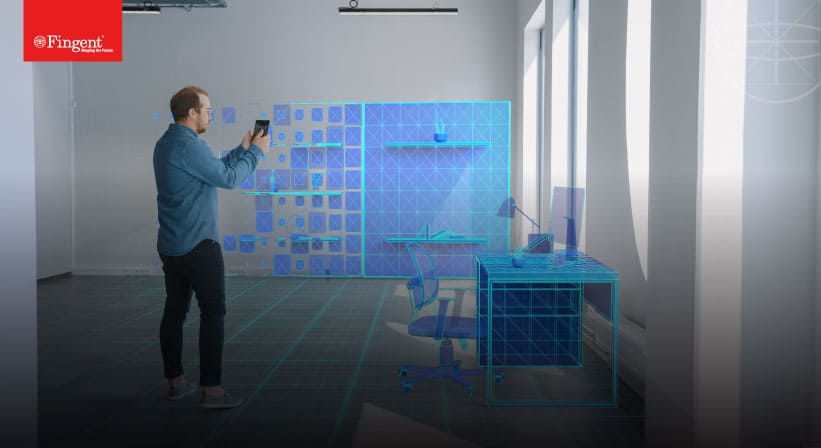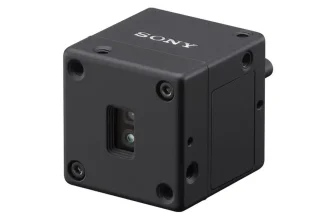
Check out our latest products
Conventional property brochures are as antiquated as dial-up internet. Today’s smart clients seek more dynamic interactions, engaging visuals, and an experience that ignites their imagination right from the get-go. Here’s introducing AR for real estate!
Augmented Reality (AR) is a technology transforming the real estate industry. It is the digital superhero that saves you from dull sales pitches and opens virtual doors to unforgettable experiences.
The global AR market is exploding! Valued at $62.75 billion in 2023, it’s forecasted to skyrocket to $1,869.4 billion by 2032, with a jaw-dropping annual growth rate of 45.4%. In short, AR for real estate isn’t just the future—it’s a billion-dollar revolution in the making.
Transform Your Real Estate Operations with New-age Technologies. Discover Unique Opportunities with Our Proptech Solutions
What does AR Mean in Real Estate?
What is AR in Real Estate? Picture this: your client is on their couch, wearing pajamas, yet they’re walking through a chic penthouse or visualizing furniture arrangements. That’s Augmented Reality for real estate, blending the physical world with virtual magic. AR apps layer 3D visuals over the real world, making properties come alive before a single brick is laid. AR for real estate transforms how stakeholders interact with properties. This enhanced interactivity fosters better decision-making and emotional connections to properties.
The Bottom line: The emotional connection AR fosters is critical. Buyers can “feel” a home through virtual staging or immerse themselves in potential layouts, which traditional brochures or 2D photos can’t replicate. Agencies that capitalize on this psychological engagement see a direct boost in inquiries and closures.
Why Does Your Agency Need AR?
Beyond the wow factor, AR solves real problems. Got a hard-to-sell fixer-upper? AR can show clients its potential – fully renovated. Working with international buyers? Let them tour properties without the plane ticket. And don’t forget the brownie points for being that agency—the one with cutting-edge tools that make competitors look outdated.
How AR can Supercharge Your Sales
Agencies using AR for property marketing have seen conversion rates jump by up to 40%. Let’s consider some ways in which AR can improve sales.
1. Virtual Staging Without the Hassle
Why spend on physical staging when you can do it digitally? With AR, clients can swap out furniture and even experiment with wall colors, all through an app.
Using virtual staging can cut staging costs by as much as 97%, making it a game-changer for agencies. Instead of spending on furniture rentals and physical setups, agencies can digitally transform empty spaces, creating visually appealing designs at a fraction of the cost.
2. Interactive Tours Anytime, Anywhere
What’s better than an open house? A 24/7 open house. AR tours let clients explore properties from their phones. Perfect for buyers who are always “too busy” or live three time zones away.
3. Create Buzz with AR Campaigns
Want to go viral? Use AR in ads. Let clients drop a 3D property model into their backyard or preview future developments in real-time.
4. Make Complex Data Simple
Is the client worried about the surrounding infrastructure? Overlay future schools, parks, and transit routes onto maps using AR, turning confusion into clarity.
The Takeaway: Aside from dazzling clients, AR simplifies your workflow. It reduces staging costs, accelerates decision-making, and eliminates the need for endless showings.
If you want to stay ahead in the fiercely competitive real estate market, AR isn’t optional—it’s essential. From captivating listings to confident closings, Augmented Reality for real estate is transforming how agencies operate.
Key Applications of AR in Real Estate Development
AR doesn’t just add the trimmings—it delivers measurable benefits. Agencies using AR can offer clients unparalleled convenience and transparency. For instance, AR-enabled property listings reduce site visits and help focus on serious buyers. Agencies that embrace AR report quicker sales cycles and stronger customer satisfaction. Here is how:
1. Site Visualization
With AR, developers and planners can overlay proposed buildings onto real-world settings to evaluate aesthetics, sunlight exposure, and urban integration. This capability is particularly useful during community planning to gain stakeholder buy-in.
2. Virtual Property Tours
AR transforms remote buying. Clients worldwide can explore properties interactively, cutting down logistical hurdles and allowing agencies to expand their reach internationally.
3. Architectural Collaboration
Designers use AR to test concepts onsite. For instance, architects can project design elements onto construction sites to visualize how features integrate with the environment, reducing costly post-construction adjustments.
4. Marketing and Pre-Sales
AR enables developers to promote yet-to-be-built properties with dynamic 3D models and walk-through experiences. This innovation increases buyer confidence, especially in pre-sale investments.
It’s Time To Power Your Real Estate Business with Modern Software Solutions
Explore Our Proptech Services Now!
Impact of AR on Real Estate Stakeholders
With AR, real estate isn’t just sold—it’s felt, imagined, and brought to life before a single brick is laid. Here are some of the benefits to all stakeholders:
Buyers and Renters
Benefit: AR enhances clarity and trust in decision-making, as buyers can visualize the exact room dimensions and aesthetics.
Example: Renters can preview furnished spaces, avoiding mismatches in expectations.
Real Estate Agents
Benefit: AR tools simplify client handling by pre-qualifying buyers with virtual tours and reducing unnecessary visits.
Example: AR agents report higher retention rates due to interactive property showcases.
Developers
Benefit: AR reduces project costs by identifying design issues early and providing detailed pre-construction previews.
Example: Developers minimize staging and mock-up expenses by showcasing AR-enhanced models instead.
Challenges and Considerations in Implementing AR
Every groundbreaking technology has its hurdles—AR is no exception—but the rewards far outweigh the roadblocks.
1. Cost of Development
Custom AR solutions can be expensive, particularly for small and mid-sized agencies. However, scalable subscription models are emerging to make AR adoption more accessible.
2. Accessibility for Clients
While AR smartphones are widespread, ensuring seamless compatibility and usability across devices is crucial for success. Agencies must also educate clients on using the technology effectively.
3. Integration with Legacy Systems
Incorporating AR into existing workflows and platforms requires training and time, which can slow adoption in traditional agencies.
Future Trends and Innovations in AR for Real Estate
The future of AR in real estate isn’t just bright—it’s transformative, paving the way for smarter, immersive, and boundary-breaking experiences.
1. AR Glasses for Enhanced Experiences
The next wave will likely include AR glasses, allowing clients to visualize properties while onsite without relying on screens.
2. AI-Driven AR
Artificial intelligence will supercharge AR’s ability to tailor experiences based on user preferences, offering hyper-personalized property suggestions.
3. Blockchain Integration
Blockchain could ensure secure property transactions through AR platforms, making deals more transparent and faster.
4. Expansion into Metaverse Real Estate
With metaverse development accelerating, AR could bridge physical and virtual real estate markets, opening up new sales channels.
Augment Your User Engagement & Real Estate Services with AR.
Explore Your Opportunities Now!
Embrace AR and Transform Viewers Into Buyers
For real estate agencies, AR for real estate is no longer a luxury—it’s a necessity. It’s time to embrace AR, turn your listings into interactive adventures, and transform curious viewers into committed buyers. As the technology evolves, agencies that adopt it early will be the leaders shaping tomorrow’s real estate market.
Ready to be the agency everyone’s talking about? Start using AR today and turn “maybe” into “sold” faster than you can say “Augmented Reality!”


![[5G & 2.4G] Indoor/Outdoor Security Camera for Home, Baby/Elder/Dog/Pet Camera with Phone App, Wi-Fi Camera w/Spotlight, Color Night Vision, 2-Way Audio, 24/7, SD/Cloud Storage, Work w/Alexa, 2Pack](https://m.media-amazon.com/images/I/71gzKbvCrrL._AC_SL1500_.jpg)



![[3 Pack] Sport Bands Compatible with Fitbit Charge 5 Bands Women Men, Adjustable Soft Silicone Charge 5 Wristband Strap for Fitbit Charge 5, Large](https://m.media-amazon.com/images/I/61Tqj4Sz2rL._AC_SL1500_.jpg)





